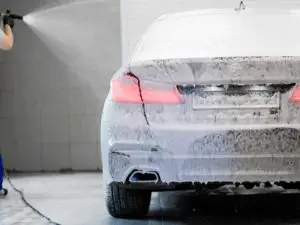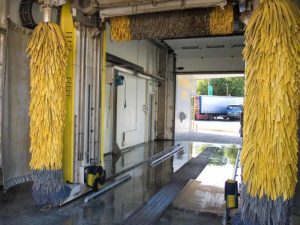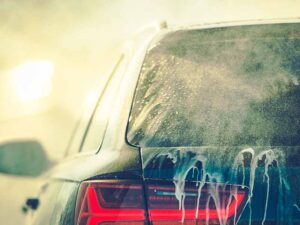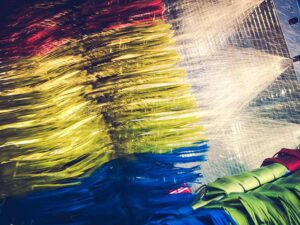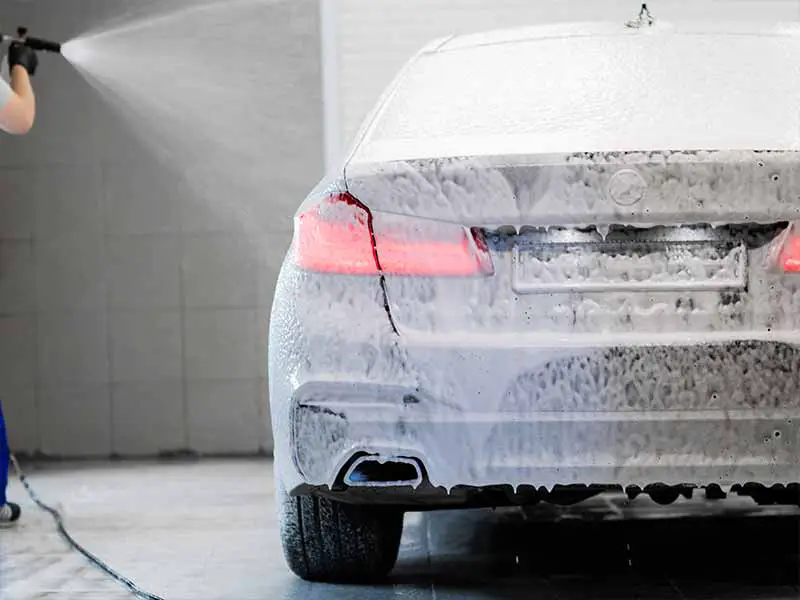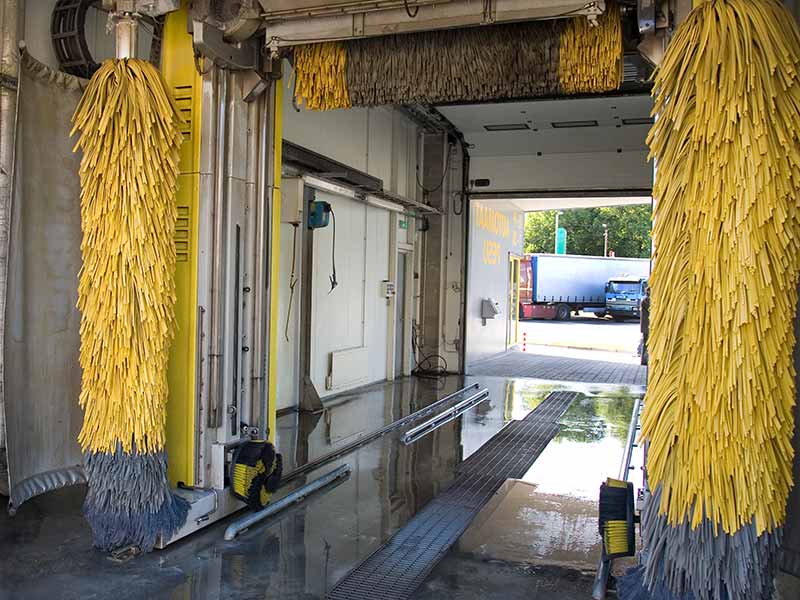Table of Contents
Pressure washers have some great benefits such as speeding up the car washing process, conserving water, making the washing job easier, and minimizing the potential for swirls and scratches in your clear coat.
You’ll also need to understand how to use your new car pressure washer properly to prevent damaging your vehicle’s finish and get the most out of it.
It’s all not as complicated as it sounds so let’s dive right in.
How To Pressure Wash Your Car
Here are the steps to ensure you pressure wash your car properly:
- First, rinse your car with water only and a minimum of a 25-degree nozzle tip to remove mud, dirt, road grime, etc.
- Use a foam cannon and a ph neutral car wash shampoo to coat your car or truck in a thick layer of suds
- Allow the suds to sit for a few minutes and break down the dirt and debris on the finish
‘
If your car is very dirty:
- Starting at the top, use a quality microfiber wash mitt to clean all of the exterior surfaces
- Avoid allowing the soap to dry and re-foam occasionally if necessary
- Rinse with a minimum 25-degree nozzle tip
If your car is only slightly dirty:
- Rinse your car with water only and a minimum 25-degree tip – the dirt should be loosened enough from the soap to be blasted away
- Dry your car or truck with an air dryer
For more information on best practices when washing your car you should read our article “Best Way To Wash A Car Without Scratching The Paint“.
Gas vs Electric Washer
Should you go with a gas or electric for car pressure washing? There are pros and cons to each obviously, but which is best? Electric pressure washers are ideal for pressure washing vehicles.
- Electric Pressure Washer -Will generally be quieter, cheaper, lighter, have adequate pressure, little maintenance, and not require having to deal with refueling.
- Gas Pressure Washer will generally be quite loud, more expensive, heavier, have an excess of pressure, regular maintenance, and of course require regular refueling.
Extension Cord?
Another key difference to keep in mind between a gas and electric pressure washer is that you’re tethered to an electrical outlet when using a pressure washer that’s electric. This seems obvious, which it is, but the issue that isn’t obvious is that you generally shouldn’t use an extension cord with an electric pressure washer.
Electric washers draw a large amount of power and typical extension cords are not up to the task of conducting enough juice. You can purchase a high-quality extension cord that is unusually thick in gauge but you should ensure that the manufacturer states this is possible when using a pressure washer and follow any requirements they give.
Heavy Duty 50 foot / 10 gauge extension cord
Best Pressure Washer For Detailing Cars
If you’re determined to go with a budget electric pressure washer then the Karcher K1700 is the one to get. It currently can be had for a couple of bucks LESS than the popular but less reliable Sun Joe SPX3000.
The big differentiator between the K1700 and other consumer-grade pressure washers is that it is much better built and has a 3-year warranty from the manufacturer where they will send you a new unit as a replacement. You may have to return the defective unit but that isn’t always the case.
If your car wash budget is a little more flexible you may want to consider the Sun Joe SPX9007-Pro. This is quite a bit more rugged than the K1700 for similar performance but what you get is a much more reliable commercial-grade product.
While consumer-grade products aren’t designed to take any real abuse and are prone to failure, the Sun Joe SPX9007-Pro is a rugged monster. It’s capable of cranking out 1800 PSI at 1.6 GPM.
It comes with a 34-inch spray wand with the trigger as well as several spray nozzles including 0°, 15°, 25°, 40°, and a foaming tip. It also comes with a long 25′ high-pressure hose.
For those that refuse to compromise when washing your car, there are always outstanding wallet-busting products, and the Kranzle K1122TST is one. While most consumer-grade electric pressure washers are fairly unreliable, this pressure washer is built like a tank. It will seriously lighten your wallet but you get what you pay for.
Because of the metal construction, this isn’t a light-weight car washer, but it is still very maneuverable. At 80 pounds it is hefty but the large integrated wheels make it easy to move around and position where it’s most convenient.
It incorporates a hose reel to keep things tidy and the winding handle folds away when you’re done. Additionally, the hose that is included is wire-braided for incredible durability and is a lengthy 50 feet long. The power cable is another 35 feet in length giving you a total of 85 feet of reach, not including spray distance.
The pump is capable of outputting 1400 PSI at 2.1 gallons per minute which is more than adequate for pressure washing cars. Another nice feature is the automatic start/stop function of the motor which helps with efficiency and extends the life of the hardware, but also keeps things quiet when not in use.
Is it safe to wash a car with a pressure washer?
Pressure washing car paint is safe for your car provided you use the proper tip, don’t exceed 2000 PSI, and take care where you’re spraying pressurized water.
Always be careful what you’re spraying when you pressure wash. Some bits on your car or truck can be more fragile than others. If the pressure you’re using is on the high side you may find that while the finish doesn’t get damaged from the pressure, some other bits and pieces may not be able to take the stress during washing.
Another important safety tip is to be sure and not kick up dirt, rocks, or other debris around your vehicle. When you pressure wash your car, make sure not to spray water on the ground near it. This is to prevent debris from flying up and nicking or chipping the finish.
What nozzle for pressure washing a car?
The nozzle you use is also very important when you wash your car. Especially if you can’t adjust the water pressure of your washer via a setting on the unit. Nozzle tips can adjust the pressure coming out of your washer.
You want to use a nozzle tip that creates a wide spread so as not to concentrate all of the water pressure in one spot on your car or truck. Tips that are 25-degree angle or wider are recommended. 40-degree nozzles are typically best for a gas pressure washer. The wider 40-degree nozzle will be far more gentle when using these higher-powered pressure washers to wash your car. A 40-degree nozzle on an electric pressure washer is best for rinsing.
Foam Cannon
Your pressure washer may come with a detergent tank. Whether it does or not, most people will recommend using a quality foam cannon attachment. A good foam cannon is designed to provide a thick coating of foamy suds on the surface of your car.
A thick coating of foam will increase the amount of time that the soap can work at loosening the dirt and road grime from the surface of your car or truck.

Foam Cannon
KitDo you need a special soap for a foam cannon?
A ph neutral car shampoo is ideal to get the job done but you don’t need a soap specifically designed for foam cannons. A ph neutral car shampoo should be used whether you’re hand washing your car or using a foam cannon. The reason is that this will loosen dirt and grit without stripping away wax or paint sealant.
Dishwashing soap or similar products aren’t the best idea unless you want to strip away some of your wax or paint sealant. You can’t count on it stripping it all off and leaving your clear coat completely unprotected but it will wear it away far more than a quality ph neutral car shampoo.
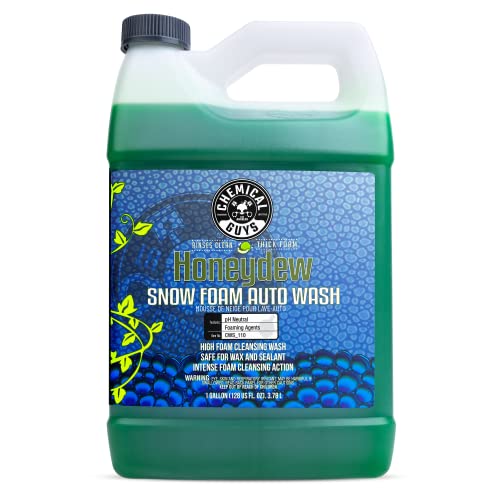
Helpful Links
Conclusion
Pressure washing a car is pretty straight-forward but you do need to follow the safety tips suggested. In short, make sure your pressure is less than 2000 PSI, and the nozzle is wider than 25-degree, and you take care not to kick up rocks and debris from the ground that could damage your vehicle.
A good quality foam cannon and a ph neutral car shampoo round out the recommendations. This will protect your wax or paint sealant while maximizing the cleaning power of the shampoo and reducing opportunities that could cause swirls and scratches in your clear coat.


